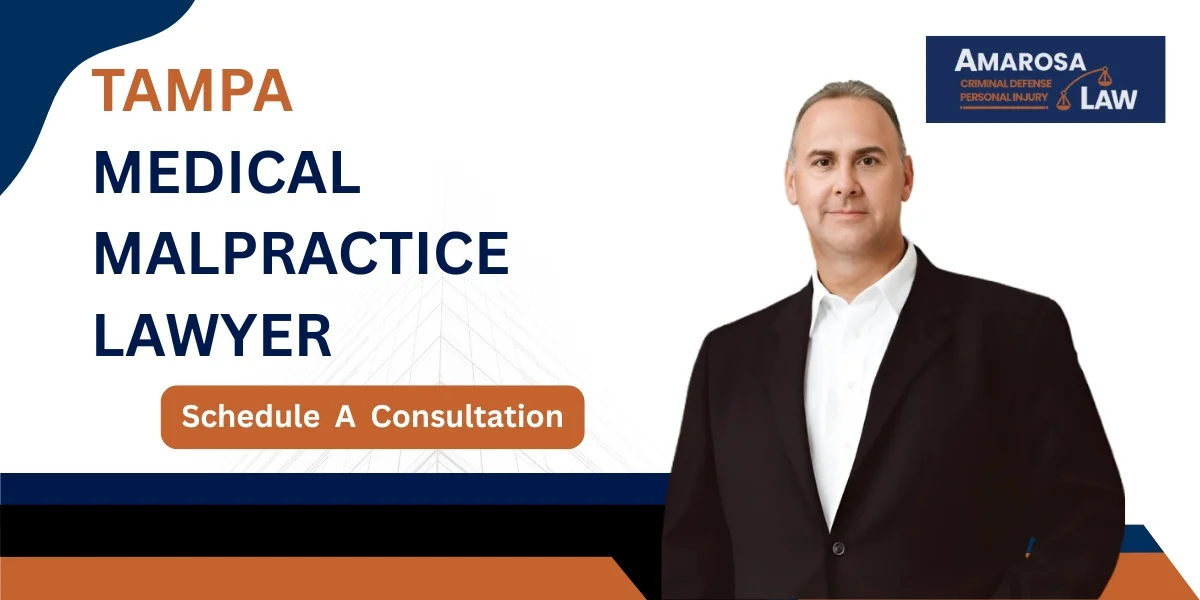Tampa Medical Malpractice Lawyer

Medical Malpractice Attorney In Tampa, FL
Medical malpractice is the failure of a health care provider to render care in keeping with reasonable accepted medical techniques or principles. In other words, a doctor, nurse or technician does something not in keeping with good practice and has breach the professional duty of the standard of care, or fails to do something necessary for the patient’s well-being. If you’ve been harmed due to such negligence, a Tampa Medical Malpractice Lawyer can help you pursue justice.
Who Can Sue for Medical Malpractice?
When a patient is injured due to medical negligence, the patient may bring suit. If the injuries are severe, permanent and disabling, members of the patient’s family – spouse, children, or parents – may have a claim. In Florida, parents can only sue for malpractice if their children are 25 or under. Over 25 year old adult children may not sue over the death or injury of parents.
Who can be sued for Medical Malpractice?
Anyone who has caused injury to the patient because of professional negligence may be named as a defendant.
How long do I have to bring suit?
Florida has a two-year statute of limitations in medical negligence cases. Generally, this means that the lawsuit must be brought within two years from the time the patient, family member, or guardian knew or should have known with reasonable diligence that the injury occurred with a reasonable possibility that medical malpractice caused it; however, under Florida’s “statute of repose,” – unless there is fraud, misrepresentation, or concealment, one can never sue a health care provider in most cases more than four years after the actual malpractice incident.
Can I expect the same result in my case as in similar cases?
Each case must be evaluated on its merits. These include:
- How clear is the defendant’s negligence?
- How hard is it to prove the defendant’s negligence?
- What are the damages?
- What sort of witnesses will the plaintiff and health care providers make?
- Where is the venue?
- What are the legal issues presented?
AMAROSA LAW FIRM P.A. Finding Solutions For Tough Cases.
Available 24 Hours a Day
What must I prove in my case?
A plaintiff in a professional negligence case brought against a health care professional must introduce evidence which the court finds sufficient to establish all three of the following:
- Negligence is defined as the failure to use ordinary care. Professional negligence is the failure of a health care provider to do something that should have been done in keeping with good and accepted medical or nursing practice or the failure to do something that should have been done in keeping with good and accepted medical or nursing practice.
- Proximate cause is a legal concept which essentially means a legal cause. One must prove that the health care provider’s negligence did cause the plaintiff’s injuries and that the injury suffered by the patient (or some similar injury) was reasonably foreseeable beforehand as a result of the health care provider’s failure to render appropriate care.
- Damage is the harm done to the patient that directly results from the health care provider’s negligence. It is the physical, emotional and financial harm that the plaintiff experienced as a result of the incident.
How do I go about proving my case?
Tampa, FL, in every and any instance, requires proof of medical negligence by way of expert testimony. A physician who is licensed, practicing now or at the time in question, practices in the same field of medicine as the health care provider you believed was negligent and who is familiar with the standards of good and accepted medical practice for the care in question must testify that the professional standards were not met. The expert must establish what the standards of good practice were and how the defendant, by his or her actions, violated those principles.
How will I go about paying for your time and expenses?
Most malpractice cases are handled on a contingent fee agreement. The agreement executed by our clients provides that the Amarosa Law Firm, P.A. receives a percentage of the recovery made by the client as a result of the prosecution of the case.
We do not expect the client to pay or defray any of the expenses of developing the case until such time as a recovery is made. At that time, those expenses will be deducted from the settlement. In the event no recovery is realized, we do not expect the client to repay the out of pocket costs for developing the case.
What kind of expenses are involved?
The prosecution of a malpractice case is very expensive. Medical records must be obtained, depositions must be taken, and experts must be paid. The investment also includes costs for exhibits and technology to fully demonstrate the devastating injuries that are personal to each of our clients. The cost for our firm to develop a medical negligence case today often runs $50,000 to $200,000. In more complex cases, this cost may be substantially higher.
